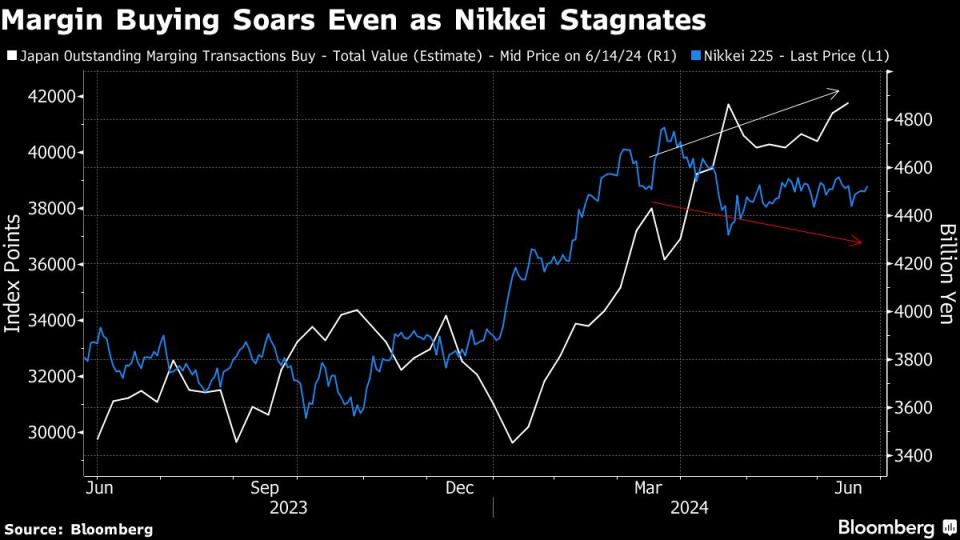Margin Trades of $30 Billion Add to Risks for Japan Stock Rally
(Bloomberg) -- Japanese shares’ slide from record highs has spawned another major risk: bullish individuals have built up the biggest margin buying positions since 2006 that they may have to unwind.
Most Read from Bloomberg
YouTuber Dr Disrespect Was Allegedly Kicked Off Twitch for Messaging Minor
VW Latches Onto Rivian in $5 Billion EV Pact to Regain Momentum
Nvidia Rout Takes Breather as Traders Scour Charts for Support
Julian Assange Leaves Court ‘Free Man,’ Ending 14-Year Drama
Total positions held by the nation’s army of retail investors reached ¥4.91 trillion ($30.8 billion) as of June 21, as leveraged, often high-risk bets continued to expand despite the Nikkei 225 index losing 4% since peaking in March.
After their stellar ascent, Japanese stocks are lagging behind their global peers in recent months due to lackluster domestic economic growth, disappointing earnings guidance from companies and worries about the fallout from the Bank of Japan raising borrowing costs. Margin buyers in effect borrow money from brokerages to buy shares often with high leverage, and if the market weakens the investors may need to close out their positions, leading to further selling.
Demand to buy on margin still appears strong despite the share market’s decline. Retail investors’ margin buying position is 6.4 times larger than margin selling, far above the historical average of 3.31 and a sign that they’re still bullish toward Japanese equities. One focus is corporate earnings: if profits rise that may prompt firms to raise wages, in a boon for consumers.
“We have earnings season in about a month, and people are expecting upgrades in earnings guidance,” said Masayuki Doshida, senior market analyst at Rakuten Economic Research Institute. “But if we don’t see that, we need to be cautious” about selling from margin buyers, he said.
A large part of margin trades that brokerages offer to investors only last for six months. There’s a chance that investors will close trades by September, given their position started to build up early this year when shares were headed to record levels, said Kohei Onishi, senior investment strategist at Mitsubishi UFJ Morgan Stanley Securities Co.
The cost of having a margin buying position also looks set to increase if the Bank of Japan raises interest rates again possibly next month. A hike to around 0.25% may not sound like much, but it will be the highest policy rate in Japan since 2008, raising worries about unexpected fallout.
Some analysts think worries about margin positions are overblown. These positions today represent just above 0.5% of the market’s total capitalization, and compares with a peak of more than 1.1% marked in 2006.
Seiichi Suzuki, chief equity market analyst at Tokai Tokyo Intelligence Laboratory, says there’s only limited risk that investors will be forced to sell because losses on their positions are very light at the moment.
Still, the latest build-up of leveraged buying reminds some of a boom in 2006 when margin trading surged to as high as ¥5.5 trillion.
“There are similarities. At that time, we had a weak yen, rises in commodity prices and the BOJ’s rate hike before we ended up in the Lehman crisis,” said Tomoichiro Kubota, senior market analyst at Matsui Securities Co. “I hope history isn’t repeating itself, but it may be rhyming.”
Most Read from Bloomberg Businessweek
How Jeff Yass Became One of the Most Influential Billionaires in the 2024 Election
Why BYD’s Wang Chuanfu Could Be China’s Version of Henry Ford
Independence Without Accountability: The Fed’s Great Inflation Fail
©2024 Bloomberg L.P.

 Yahoo Finance
Yahoo Finance 


